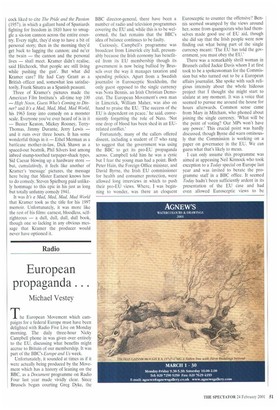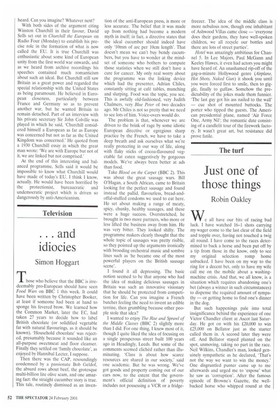European propaganda . . .
Michael Vestey
The European Movement which campaigns for a federal Europe must have been delighted with Radio Five Live on Monday morning. The daily three-hour Nicky Campbell phone in was given over entirely to the EU, discussing what benefits might accrue to Britain of our membership. It was part of the BBC's Europe and Us week.
Unfortunately, it sounded at times as if it were actually being produced by the Movement which has a history of leaning on the BBC, as a Document programme on Radio Four last year made vividly clear. Since Brussels began courting Greg Dyke, the
BBC director-general, there have been a number of radio and television programmes covering the EU and, while this is to be welcomed, the fact remains that the BBC's idea of balance continues to be faulty.
Curiously, Campbell's programme was broadcast from Limerick city hall, presumably because the Irish economy has benefited from its EU membership though its government is now being bullied by Brussels over the way it manages taxation and spending policies. Apart from a Swedish journalist in Eurosceptic Stockholm, the only guest opposed to the single currency was Nora Bennis. an Irish Christian Democrat. The European Movement's own man in Limerick, William Maher, was also on hand to praise the EU. 'The success of the EU is dependent on peace,' he said, conveniently forgetting the role of Nato. 'Not one drop of blood has been shed in an EUrelated conflict.'
Fortunately, many of the callers offered dissent, including a student of 17 who rang to suggest that the government was using the BBC to get its pro-EU propaganda across. Campbell told him he was a cynic but I fear the young man had a point. Both Peter Hain, the Foreign Office minister, and David Byrne, the Irish EU commissioner for health and consumer protection, were allowed long interviews in which to push their pro-EU views. Where, I was beginning to wonder, was there an eloquent
Eurosceptic to counter the offensive? Bennis seemed swamped by the views around her, some from quangocrats who had themselves made good use of EU aid, though she did say that the Irish people were now finding out what being part of the single currency meant: 'The EU has told the government, you must obey the EU.'
There was a remarkably shrill woman in Brussels called Jackie Davis whom I at first took to be a spokeswoman for the Commission but who turned out to be a European affairs journalist. She spoke with such religious intensity about the whole hideous project that I thought she might start to ululate at any moment. It was a voice that seemed to pursue me around the house for hours afterwards. Common sense came from Mary in Mitcham, who phoned about joining the single currency, 'What will be the point of voting? Our MPs won't have any power.' This crucial point was hardly discussed, though Byrne did warn ominously that the Commission is working on a paper on governance in the EU. We can guess what that's likely to mean.
I can only assume this programme was aimed at appeasing Neil Kinnock who took exception to a Today special on Europe last year and was invited to berate the programme staff in a BBC office. It seemed Today hadn't been sufficiently ardent in its presentation of the EU case and had even allowed Eurosceptic views to be
heard. Can you imagine? Whatever next?
With both sides of the argument citing Winston Churchill in their favour, David Sells set out in Churchill the European on Radio Four (Monday) to establish his precise role in the formation of what is now called the EU. It is true Churchill was enthusiastic about some kind of European unity from the first world war onwards, and as we heard from archive recordings his speeches contained much romanticism about such an ideal. But Churchill still saw Britain as a great power and regarded the special relationship with the United States as being paramount. He believed in European closeness, particularly between France and Germany so as to prevent another war, but he wanted Britain to remain detached. Part of an interview with his private secretary Sir John Colville was played in which he said, 'Churchill considered himself a European as far as Europe was concerned but not as far as the United Kingdom was concerned.' He quoted from a 1930 Churchill essay in which the great man wrote: 'We are with Europe but not of it, we are linked but not comprised.'
At the end of this interesting and balanced programme, Sells said it would be impossible to know what Churchill would have made of today's EU. I think I know, actually. He would have been horrified by the protectionist, bureaucratic and undemocratic project which is driven so dangerously by anti-Americanism.



































































 Previous page
Previous page